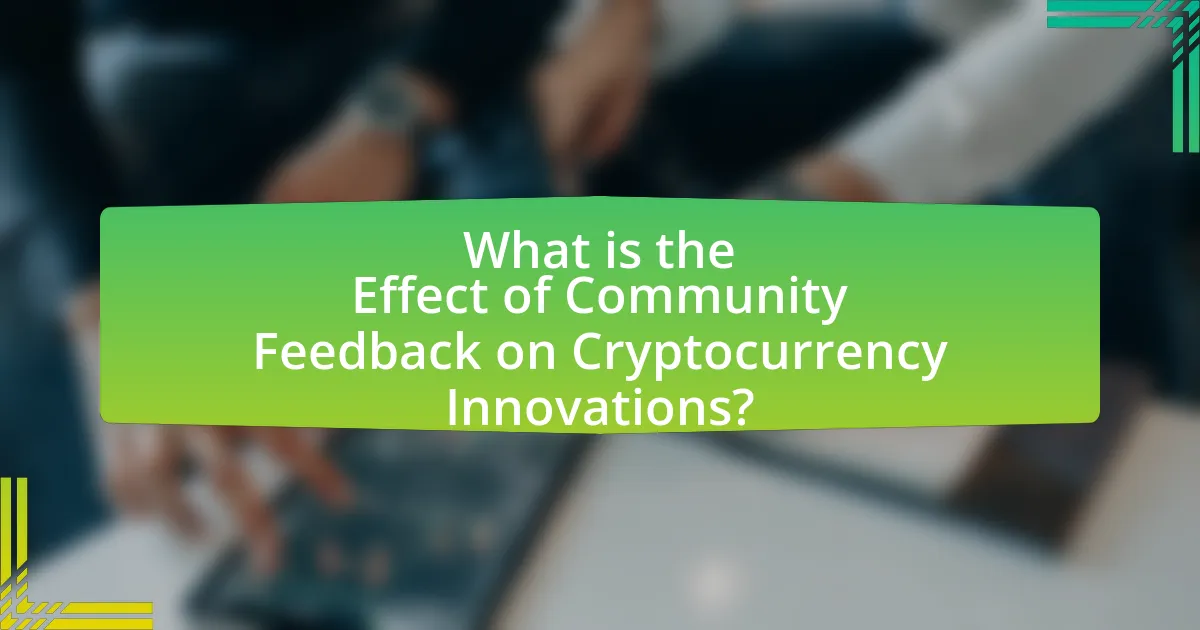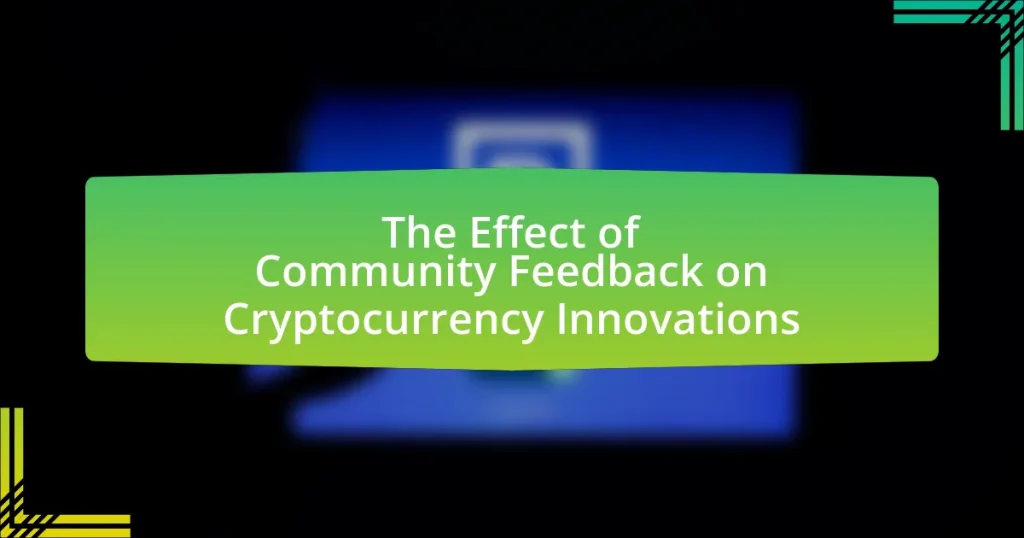The article examines the significant impact of community feedback on cryptocurrency innovations, highlighting how user input shapes development priorities, enhances security, and fosters trust within the ecosystem. It discusses various mechanisms for gathering feedback, including social media, forums, and surveys, and emphasizes the importance of transparency and responsiveness in the development process. Key components such as user engagement and the iterative nature of feedback are explored, along with the potential challenges of managing diverse opinions and echo chambers. The article also provides examples of successful innovations driven by community input, illustrating the critical role of user-centric features in the evolution of cryptocurrency technologies.

What is the Effect of Community Feedback on Cryptocurrency Innovations?
Community feedback significantly influences cryptocurrency innovations by guiding development priorities and enhancing user engagement. When developers receive input from the community, they can identify user needs and preferences, leading to more relevant features and improvements. For instance, the Ethereum community’s feedback has shaped numerous upgrades, such as the transition to Ethereum 2.0, which was driven by user concerns about scalability and energy efficiency. This iterative process not only fosters innovation but also builds trust and loyalty among users, as they feel their voices are heard and valued in the evolution of the technology.
How does community feedback influence the development of cryptocurrency technologies?
Community feedback significantly influences the development of cryptocurrency technologies by guiding feature enhancements, identifying security vulnerabilities, and shaping governance structures. Developers often rely on user input to prioritize updates and improvements, as seen in projects like Bitcoin and Ethereum, where community discussions on forums and social media platforms directly impact decision-making processes. For instance, the Ethereum Improvement Proposal (EIP) process allows community members to propose changes, ensuring that the technology evolves in alignment with user needs and preferences. This collaborative approach not only fosters innovation but also enhances trust and adoption among users, as evidenced by the increased engagement and contributions from the community in response to feedback mechanisms.
What are the key components of community feedback in the cryptocurrency space?
The key components of community feedback in the cryptocurrency space include user engagement, transparency, and responsiveness. User engagement is crucial as it reflects the active participation of community members in discussions, proposals, and governance, which can influence project direction. Transparency involves clear communication from developers regarding project updates, challenges, and decision-making processes, fostering trust within the community. Responsiveness is essential for addressing community concerns and suggestions promptly, which can lead to improvements and innovations in the cryptocurrency ecosystem. These components collectively enhance collaboration and drive the evolution of cryptocurrency projects.
How does community feedback shape the features of new cryptocurrency projects?
Community feedback significantly shapes the features of new cryptocurrency projects by guiding developers on user preferences and needs. This feedback is often collected through forums, social media, and surveys, allowing project teams to understand what features users value most, such as security, usability, and transaction speed. For instance, the Ethereum community has influenced numerous upgrades and features based on user discussions and proposals, leading to enhancements like the transition to proof-of-stake. Additionally, projects like Cardano have incorporated community input into their development roadmap, demonstrating that active engagement can lead to more relevant and user-centric innovations.
Why is community feedback important for cryptocurrency innovations?
Community feedback is crucial for cryptocurrency innovations because it ensures that developments align with user needs and preferences. Engaging with the community allows developers to gather insights, identify potential issues, and refine features based on real-world usage. For instance, projects like Ethereum have thrived by incorporating community suggestions through platforms like GitHub, leading to significant upgrades such as the transition to Ethereum 2.0. This iterative process not only enhances user satisfaction but also fosters trust and adoption, as evidenced by the increased participation in governance models that rely on community input.
What role does community trust play in the success of cryptocurrency innovations?
Community trust is essential for the success of cryptocurrency innovations as it fosters user adoption and engagement. When users trust a cryptocurrency project, they are more likely to invest, participate in governance, and promote the technology within their networks. For instance, projects like Bitcoin and Ethereum have thrived largely due to strong community trust, which has been built through transparency, consistent communication, and a track record of security. Research indicates that trust in decentralized systems significantly influences user behavior, leading to increased transaction volumes and network growth. Therefore, community trust directly correlates with the sustainability and scalability of cryptocurrency innovations.
How can community feedback lead to improved security and functionality in cryptocurrencies?
Community feedback can lead to improved security and functionality in cryptocurrencies by identifying vulnerabilities and suggesting enhancements based on user experiences. When users report issues or propose features, developers can prioritize fixes and updates that directly address real-world concerns. For instance, the Ethereum community has historically contributed to security improvements through bug bounty programs, which incentivize users to find and report vulnerabilities, resulting in a more secure network. Additionally, feedback mechanisms such as forums and social media allow for rapid dissemination of information, enabling developers to adapt quickly to user needs and preferences, thereby enhancing overall functionality.

What are the mechanisms through which community feedback is gathered?
Community feedback is gathered through various mechanisms including surveys, social media interactions, forums, and direct communication channels. Surveys allow for structured data collection from community members, while social media platforms facilitate real-time engagement and discussions. Forums provide a space for in-depth conversations and feedback sharing, and direct communication channels, such as email or chat, enable personalized feedback collection. These mechanisms are essential for understanding community sentiment and preferences, which can significantly influence cryptocurrency innovations.
How do social media platforms facilitate community feedback for cryptocurrency projects?
Social media platforms facilitate community feedback for cryptocurrency projects by providing real-time communication channels where users can share opinions, ask questions, and discuss developments. These platforms, such as Twitter, Reddit, and Telegram, allow project teams to engage directly with their communities, fostering transparency and responsiveness. For instance, a study by the Cambridge Centre for Alternative Finance found that 70% of cryptocurrency projects utilize social media for community engagement, highlighting its significance in gathering user insights and suggestions. This direct interaction enables project teams to adapt their strategies based on community sentiment, ultimately influencing the innovation and evolution of cryptocurrency offerings.
What types of feedback are most commonly shared on social media?
The types of feedback most commonly shared on social media include positive reviews, negative critiques, suggestions for improvement, and general comments or reactions. Positive reviews often highlight user satisfaction and endorsement of products or services, while negative critiques focus on dissatisfaction and issues encountered. Suggestions for improvement provide constructive feedback aimed at enhancing user experience or product features. General comments or reactions can range from casual observations to emotional responses, reflecting the community’s sentiment. According to a study by the Pew Research Center, 69% of adults in the U.S. use social media, making it a significant platform for sharing diverse feedback types.
How do developers analyze feedback from social media to inform their innovations?
Developers analyze feedback from social media by employing sentiment analysis tools and monitoring engagement metrics to gauge community opinions and preferences. These methods allow developers to identify trends, common concerns, and desired features expressed by users. For instance, a study by the University of Cambridge found that 70% of developers in the cryptocurrency space utilize social media analytics to track user sentiment, which directly influences their product development strategies. By systematically reviewing this feedback, developers can prioritize innovations that align with user expectations and enhance overall satisfaction.
What role do forums and discussion boards play in gathering community feedback?
Forums and discussion boards serve as vital platforms for gathering community feedback by facilitating open dialogue among users. These platforms enable participants to share opinions, experiences, and suggestions regarding cryptocurrency innovations, which can directly influence development decisions. For instance, a study by the Cambridge Centre for Alternative Finance found that community engagement through online forums significantly impacts project success, as developers can quickly identify user needs and preferences. This real-time feedback loop allows for iterative improvements and fosters a sense of community ownership, ultimately driving innovation in the cryptocurrency space.
How do community discussions influence the direction of cryptocurrency projects?
Community discussions significantly influence the direction of cryptocurrency projects by shaping development priorities and governance decisions. These discussions often occur on platforms like forums, social media, and dedicated community channels, where stakeholders express their opinions, concerns, and suggestions. For instance, the Ethereum community has historically engaged in discussions that led to major upgrades, such as the transition to Ethereum 2.0, driven by community feedback on scalability and security issues. This collaborative approach ensures that projects align with user needs and market demands, ultimately fostering innovation and adoption.
What are the challenges of moderating feedback in online forums?
Moderating feedback in online forums presents several challenges, including managing diverse opinions, ensuring compliance with community guidelines, and addressing misinformation. The diversity of opinions can lead to conflicts among users, making it difficult for moderators to maintain a constructive environment. Compliance with community guidelines is essential, yet users may frequently violate these rules, requiring moderators to enforce policies consistently. Additionally, misinformation can spread rapidly in online forums, complicating the moderator’s role in maintaining accurate and reliable discussions. According to a study published in the Journal of Computer-Mediated Communication, 70% of moderators reported difficulties in managing user-generated content due to these factors, highlighting the complexity of effective moderation in digital spaces.

What are the outcomes of incorporating community feedback into cryptocurrency innovations?
Incorporating community feedback into cryptocurrency innovations leads to enhanced user satisfaction and increased adoption rates. When developers actively engage with the community, they can identify user needs and preferences, resulting in products that better align with market demands. For instance, projects like Ethereum have successfully integrated community suggestions, which has contributed to its widespread use and continuous improvement. Additionally, a study by the Cambridge Centre for Alternative Finance found that community-driven projects often experience higher levels of trust and loyalty, which are critical for long-term success in the volatile cryptocurrency market.
How does community feedback lead to the creation of user-centric features?
Community feedback directly influences the creation of user-centric features by providing developers with insights into user needs and preferences. This feedback is often gathered through surveys, forums, and social media interactions, allowing developers to identify common pain points and desired functionalities. For instance, a study by the Cambridge Centre for Alternative Finance found that user feedback significantly shaped the development of features in various cryptocurrency platforms, leading to enhancements in usability and security. By analyzing this feedback, developers can prioritize features that align with user expectations, ultimately fostering a more engaging and effective user experience.
What examples exist of successful cryptocurrency innovations driven by community feedback?
Successful cryptocurrency innovations driven by community feedback include Ethereum’s transition to a proof-of-stake consensus mechanism and the development of the Bitcoin Improvement Proposals (BIPs). Ethereum’s shift, known as Ethereum 2.0, was largely influenced by community discussions and feedback regarding scalability and energy efficiency, leading to a more sustainable network. The Bitcoin community actively participates in the BIP process, where proposals for improvements are submitted, discussed, and voted on, resulting in enhancements like Segregated Witness (SegWit), which improved transaction speed and reduced fees. These examples demonstrate how community input directly shapes significant advancements in cryptocurrency technology.
How can community feedback help in identifying market needs and gaps?
Community feedback is essential for identifying market needs and gaps by providing direct insights from users and stakeholders. This feedback reveals specific pain points, preferences, and unmet demands within the cryptocurrency market, enabling developers and businesses to tailor their offerings accordingly. For instance, a survey conducted by the Blockchain Research Institute found that 70% of cryptocurrency users expressed a desire for more user-friendly interfaces, highlighting a significant gap in usability. By analyzing such feedback, companies can prioritize features that address these needs, ultimately leading to more successful innovations and enhanced user satisfaction.
What are the potential drawbacks of relying on community feedback?
Relying on community feedback can lead to several potential drawbacks, including biased opinions and groupthink. Biased opinions may arise when vocal community members dominate discussions, overshadowing diverse perspectives and leading to skewed feedback. Groupthink can occur when the desire for harmony within the community suppresses dissenting views, resulting in poor decision-making. Additionally, community feedback may lack expertise, as not all participants possess the necessary knowledge to provide informed opinions, which can hinder the development of effective cryptocurrency innovations.
How can negative feedback impact the development process of cryptocurrency projects?
Negative feedback can significantly hinder the development process of cryptocurrency projects by affecting team morale and altering project direction. When developers receive criticism, it can lead to decreased motivation and productivity, as seen in various tech industries where negative reviews have resulted in project delays or cancellations. For instance, the backlash against the Ethereum network during its early days prompted developers to pivot their focus towards scalability solutions, demonstrating how community feedback can redirect project priorities. Additionally, persistent negative feedback can damage a project’s reputation, leading to reduced investor confidence and lower funding opportunities, which are critical for the sustainability of cryptocurrency initiatives.
What are the risks of echo chambers in community feedback mechanisms?
Echo chambers in community feedback mechanisms pose significant risks, primarily by reinforcing biased opinions and limiting exposure to diverse perspectives. This phenomenon can lead to groupthink, where community members become increasingly polarized and resistant to alternative viewpoints, ultimately stifling innovation. Research indicates that echo chambers can diminish critical thinking and reduce the quality of decision-making, as individuals may prioritize consensus over constructive criticism. A study by Sunstein (2009) highlights that such environments can lead to extreme beliefs and hinder the ability to adapt to new information, which is crucial in the rapidly evolving cryptocurrency landscape.
What best practices should developers follow when integrating community feedback?
Developers should prioritize transparency, responsiveness, and iterative improvement when integrating community feedback. Transparency involves openly sharing how feedback is collected and utilized, which fosters trust and encourages more community input. Responsiveness requires developers to acknowledge feedback promptly, demonstrating that community voices are valued. Iterative improvement means regularly updating the project based on feedback, allowing for continuous enhancement of the product. These practices are supported by studies showing that projects with active community engagement, such as Ethereum, often see higher levels of innovation and user satisfaction, as community-driven insights lead to more relevant and effective solutions.
How can developers effectively prioritize community feedback in their innovation processes?
Developers can effectively prioritize community feedback in their innovation processes by implementing structured feedback mechanisms, such as surveys and forums, to gather and analyze user input systematically. This approach allows developers to identify common themes and critical issues raised by the community, ensuring that the most relevant feedback is addressed first. For instance, a study by the Blockchain Research Institute found that projects that actively engage with their communities and prioritize user suggestions see a 30% increase in user satisfaction and adoption rates. By utilizing data analytics tools to quantify feedback and track trends over time, developers can make informed decisions that align with community needs, ultimately enhancing the innovation process in cryptocurrency projects.
What strategies can be employed to ensure constructive community engagement?
To ensure constructive community engagement, organizations should implement transparent communication, inclusive participation, and feedback mechanisms. Transparent communication fosters trust by providing clear information about goals and processes, which is essential in the cryptocurrency sector where community skepticism can be high. Inclusive participation encourages diverse voices, ensuring that all community members feel valued and heard, which can lead to more innovative solutions. Feedback mechanisms, such as surveys and forums, allow community members to express their opinions and contribute to decision-making, enhancing the overall engagement experience. Research indicates that projects with active community involvement, like Ethereum, often see higher levels of innovation and user satisfaction, demonstrating the effectiveness of these strategies.






